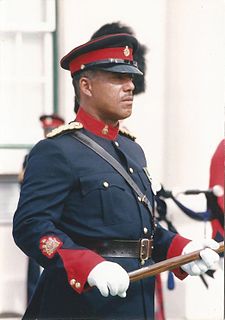
Warrant officer (WO) is a rank or category of ranks in the armed forces of many countries. Depending on the country, service, or historical context, warrant officers are sometimes classified as the most junior of the commissioned ranks, the most senior of the non-commissioned officer (NCO) ranks, or in a separate category of their own. Warrant officer ranks are especially prominent in the militaries of Commonwealth nations and the United States.

Military ranks are a system of hierarchical relationships, within armed forces, police, intelligence agencies or other institutions organized along military lines. The military rank system defines dominance, authority, and responsibility in a military hierarchy. It incorporates the principles of exercising power and authority into the military chain of command—the succession of commanders superior to subordinates through which command is exercised. The military chain of command constructs an important component for organized collective action.
Regimental sergeant major (RSM) is an appointment that may be held by warrant officers class 1 (WO1) in the British Army, the British Royal Marines and in the armies of many Commonwealth and former Commonwealth nations, including Australia, Kenya and New Zealand. It is also an appointment that may be held by chief warrant officers (CWO) in the Canadian Forces and warrant officers of any grade in the Singapore Armed Forces, and is a rank in itself in the Irish Defence Forces and formerly in the British Army, Royal Marines and United States Army. Only one warrant officer holds the appointment of RSM in a regiment or battalion, making them the senior warrant officer; in a unit with more than one WO1, the RSM is considered to be "first amongst equals". The RSM is primarily responsible for assisting their commander for maintaining standards and discipline amongst the non-commissioned members and acts as a parental figure to their subordinates.
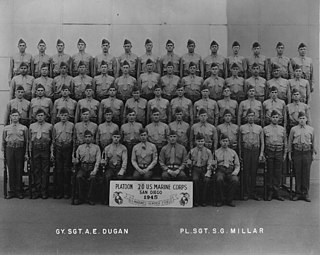
A platoon is a military unit typically composed of two or more squads, sections, or patrols. Platoon organization varies depending on the country and the branch, but a platoon can be composed of 50 people, although specific platoons may range from 10 to 100 people. A platoon is typically the smallest military unit led by a commissioned officer. The platoon leader is usually a junior officer—a second or first lieutenant or an equivalent rank. The officer is usually assisted by a platoon sergeant.

Sergeant is a rank in many uniformed organizations, principally military and policing forces. The alternative spelling, serjeant, is used in The Rifles and other units that draw their heritage from the British light infantry. Its origin is the Latin serviens, 'one who serves', through the French term sergeant.
Staff sergeant is a rank of non-commissioned officer used in the armed forces of many countries. It is also a police rank in some police services.
Sergeant major is a senior non-commissioned rank or appointment in many militaries around the world. In Commonwealth countries, the various degrees of sergeant major are appointments held by warrant officers. In the United States, there are also various grades of sergeant major, all of the same pay grade of E-9; however, the Sergeant Major of the Army and the Sergeant Major of the Marine Corps, as their respective service's Senior Enlisted Advisor, receive a special rate of basic pay that is higher than all other sergeants major.
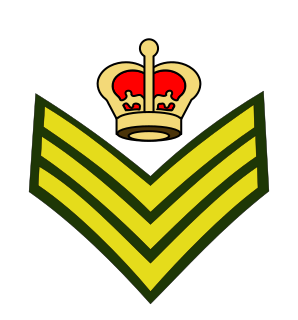
Colour sergeant or color sergeant is a rank of non-commissioned officer found in several armies and marine corps.
Band sergeant major (BSM) is the appointment held by the senior playing musician in a British Army band, who holds the rank of warrant officer class 2.

A garrison sergeant major (GSM) in the British Army is the senior warrant officer of a garrison and holds the rank of warrant officer class 1. The GSM London District, always a guardsman, holds one of the four most senior WO1 appointments in the British Army, and has military ceremonial responsibility for important state occasions such as Trooping the Colour.
The academy sergeant major is the senior non-commissioned officer instructor at a military academy.
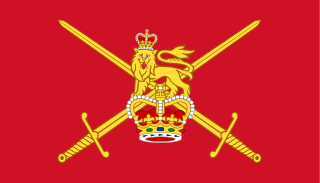
"Other ranks" is the term used to refer to all ranks below officers in the British Army and the Royal Marines. It includes warrant officers, non-commissioned officers ("NCOs") and ordinary soldiers with the rank of private or regimental equivalent. Officers may, in speaking, distinguish themselves from those "in the ranks".
Staff sergeant major is an appointment in some Commonwealth armies and also a rank in the Royal Canadian Mounted Police.
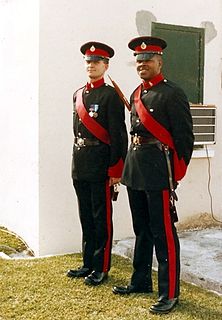
The company sergeant major (CSM) is the senior non-commissioned soldier of a company in the armies of many Commonwealth countries, responsible for administration, standards and discipline. In combat, their prime responsibility is the supply of ammunition to the company. They also oversees the distribution of other supplies, such as water or food, although that responsibility is mainly that of the company quartermaster sergeant (CQMS), and evacuating the wounded and collecting prisoners of war.

Edward Benn ('Ned') Smith VC, DCM was an English recipient of the Victoria Cross, the highest and most prestigious award for gallantry in the face of the enemy that can be awarded to British and Commonwealth forces.
A troop sergeant major (TSM) is the senior non-commissioned officer in a Royal Artillery troop of the British Army, usually holding the rank of warrant officer class 2. This differs from a cavalry troop or infantry platoon, in which the highest-ranking non-commissioned officer (NCO) is usually a sergeant.

The pipe major is the leading musician of a pipe band, whether military or civilian. Like the appointment of drum major, the position is derived from British Army traditions. During the early twentieth century, the term sergeant piper was used instead. The pipe major is often assisted by a pipe sergeant, who has similar duties in the band and leads the band in the absence of the pipe major.

A bandmaster is the leader and conductor of a band, usually a concert band, military band, brass band or a marching band.

A warrant officer (WO) in the British Armed Forces is a member of the highest group of non-commissioned ranks, holding the King's warrant, which is signed by the Secretary of State for Defence. Warrant officers are not saluted, because they do not hold the King's Commission, but they are addressed as "Sir" or "Ma'am" by subordinates. Commissioned officers may address warrant officers either by their appointment or as "Mister", "Mrs" or "Ms", and then their last name, e.g. "Mr Smith". Although often referred to along with non-commissioned officers (NCOs), they are not NCOs, but members of a separate group, although all have been promoted from NCO rank.

The Corps Regimental Sergeant Major is the most senior warrant officer of the Royal Marines. Responsible for maintaining standards and discipline within the Royal Marines, they act as a parental figure to their subordinates and also to junior officers, even though the latter technically outrank the RSM.












